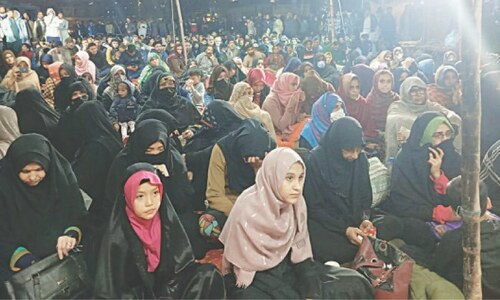KARACHI: While mainstream political parties in the country claim to be true democratic forces and entities, former chairman of Senate and senior PPP leader Senator Raza Rabbani made a candid admission on Saturday that all key political stakeholders “look to the establishment even today” to gain power and allow the establishment to violate the Constitution for that objective.
The strong remarks by the PPP stalwart came with the insistence that there was ‘no exception’ in this even including his own political party, and expressed the regret that the powerful establishment in Pakistan was now enjoying a “creeping dominance” everywhere.
At the launch of a memoir titled Pakistan in an Age of Turbulence written by former ambassador Dr Masuma Hasan held at the Pakistan Institute of International Affairs, Senator Rabbani candidly shared his experiences as a political worker, a parliamentarian and a concerned citizen who had witnessed the fast eroding space for the true democratic forces in the country.
From the perspective of Ms Hasan’s book, he referred to the state suppression of those segments of society which could have built a ‘counter narrative’ and talked about fizzled out culture of tolerance.
Speakers say activism these days is only to pamper status quo
“To achieve this target of suppression,” he said the establishment had made a very loud and clear plan decades ago which was still effective and providing the desired results.
“After the fall of Ayub Khan, the establishment sat to rethink what were those factors which brought down the powerful government,” he said.
“First it was the student unions which were seen as vanguard of democracy. So they decided to go after that and eventually banned the unions. Second thing they saw was building a counter narrative about the culture of coffee houses. So you saw how that cultural space [coffee houses] were targeted across Karachi and Lahore through a deliberate design and it all came to a stop. The third one was labour unions. The real platform of struggle and raising voice for rights of the suppressed came to naught.”
Lauding the role of Dr Hasan as a mother, senior bureaucrat and rights activist, former president of the Sindh High Court Bar Association Shahab Sarki went back to his student life when he along with his father Nuruddin Sarki personally witnessed her struggle when Fatehyab Ali Khan, her husband, who was a lawyer, social and political activist and president of Mazdoor Kisan Party, was put behind bars by General Ziaul Haq.
“The key differences in past and present is that, in the past our elders like Masuma Hasan and Fatehyab Ali Khan always challenged the status quo while these days we see activism as a way to pamper the status quo.” he said. “This book [memoir of Ms Hasan] as I conclude doesn’t only make you aware of the true history or political landscape, but it will also teach you experiences and give you inspiration to move forward.”
Calling her mother Sughra Begum, “anchor of my life”, Ms Hasan paid her tribute for her contribution in her personal life and professional career.
She also mentioned her father Sarwar Hasan and brother Arif Hasan, who’s a renowned city planner and architect, for their supportive role in her success on different fronts of life.
She got quite emotional while mentioning a chapter in her book describing it as the “most painful and sad chapter” of the memoir.
“‘Farewell to Panipat’ [her birthplace] is the most painful and sad chapter of my life and this book. It’s the place where our ancestors lived for seven centuries in the same neighbourhood,” she concluded.
Senior journalist Zubeida Mustafa also spoke.
Published in Dawn, November 6th, 2022













































